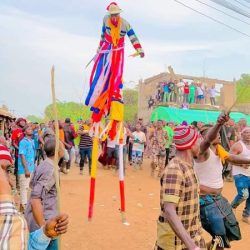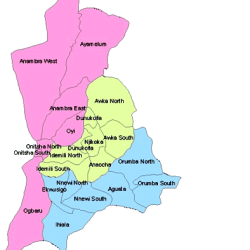
Atani is one of the fifteen indigenous communities in Ogbaru Local Government Area.
It is also the headquarter of Ogbaru Local Government Area. Ogbaru Local Government Area is located in the Northern Senatorial District of Anambra State.
Atani town which is located on the eastern bank of River Niger in Anambra State, Nigeria is also known as the food basket of Anambra State.
According to oral sources, Atani has a progenitor Afe whomigrated from Benin and settled with some persons at Ugwu Aza near Okija town in the present Ihiala LocalGovernment Area. Subsequently the people moved from Ugwu Aza to Ojii and later Abo and then to the presentsite situated along the banks of the river Niger.
Atani like other communities along the banks of the river Niger and its tributaries, participated actively in trading activities along the coast of the river Niger during the colonial era.
As a result of the trading activities in Atani over time, a trading factory was opened in Atani in 1884 , this was after other trading factories had earlier been opened at Aboh in 1843, Onitsha in 1857, Asaba 1863 and Osomari in 1877.
Outside palm produce and other commodities, slaves were also part of the articles of trade during the colonial era. Slaves were bought by wealthy men in Atani community who needed their help in farming and the females who needed their services in their trade.
Initially populated by fishermen and migrant settlers, Atani would later become the rice, fish, yam and cassava basin of Anambra state, producing a large amount of the food sold in many markets in Anambra and Delta States.
Neighbouring communities
Among their neighbours include; Odekpe, Ohaita, Ozubulu, Oko, among others.
Industries
The few private industries in town involve fish processing and rice packaging.
Notable citizens
Prof. Ben Nwabueze, the former Nigerian Minister for Education
Chief Stephen Osita Osadebe, musician
Political
The Atani political system is rotatory, which offers opportunity for the communities to share in their common political heritage. The rotatory nature of traditional rulership in Atani suggests that political interaction could be peaceful or chaotic or even both. The different political title holders perform different function in accordance with their position. In Atani it is the Onowu who crowns the king.
The king also performs judicial, executive and spiritual functions with his Ndi-iche uku and Ndichie Nta. They form the traditional government and are also members of the political assembly that rule their communities .
Besides, in Atani political structure, the interaction cut across sexes. There is the Ada (women Chiefs) which comprises the eldest daughters in the communities vested with titles.
She was called Oduah Nwanyi/ Ogene in Odekpe, Gegeli in Osamala, and Omu among others. The Ada was the political head of all the women. She also had ritual and judicial functions to perform. To take this title, she would kill a cock and give an elaborate feast. As a political head of all Umuada, she saw to it that peace was maintained among both women and men in the community. Umuada of the various neighbours of Atani usually supported each other in running the affairs of their communities. Their active role in Igboland would not be overemphasized. Hence, in Atani, they are given a pride of place due to their peculiar nature and operational milieu in Atani political structure and interaction with their neighbours.
The Umuada in conjunction with the male title holder and age grades, plan and perform various traditional festivals and ceremonies. These avenues serve as platform for inter-communal interactions and or relations between Atani and her neighbours. Their roles cut across maintaining peace and setting inter-village disputes and conflict.[5]











